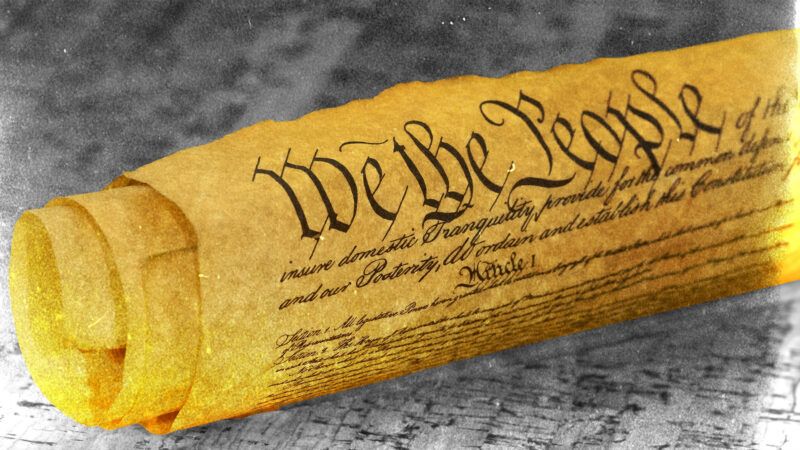Was the Bill of Rights a Bad Idea? Some Founding Fathers Thought So.
Did they have a point?

What's the first thing that comes to mind when you think about the U.S. Constitution?
For many people, the answer probably involves one of the famous individual liberties that are spelled out in the Bill of Rights, such as freedom of speech, due process, or the right to keep and bear arms. When a person argues that something is unconstitutional, what that person often means is that it violates one or more of the provisions contained in the Bill of Rights.
Yet the Constitution did not originally include the Bill of Rights when it was ratified in 1788. Why not?
You’re reading Injustice System from Damon Root and Reason. Get more of Damon’s commentary on constitutional law and American history.
The answer is that some of the framers of the original Constitution feared that if certain rights were enumerated in the text, all of the other, unenumerated rights would be left wide open for government abuse.
"It would not only be useless, but dangerous, to enumerate a number of rights which are not intended to be given up," declared future Supreme Court Justice James Iredell at the North Carolina Ratification Convention in 1788. That is "because it would be implying, in the strongest manner, that every right not included in the exception might be impaired by the government without usurpation." What is more, Iredell declared, "it would be impossible to enumerate every one. Let anyone make what collection or enumeration of rights he pleases, I will immediately mention twenty or thirty more rights not contained in it."
That was the position taken by those who came to be known as the Federalists. They thought that adding a bill of rights to the Constitution was a bad idea not because they were against individual rights, but because they despaired of what might happen to any rights that were not specifically written out.
But the Constitution's Anti-Federalist critics were not persuaded by such concerns. "The want of a Bill of Rights to accompany this proposed system," declared the Anti-Federalist pamphleteer who went by the pseudonym "John DeWitt," "is a solid objection to it." In his view, "to express those rights" which the government may not infringe was a necessary and proper safeguard against "the intrusion into society of that doctrine of tacit implication which has been the favorite theme of every tyrant from the origin of all governments to the present day."
Thomas Jefferson, who was then stationed overseas as the American ambassador to France, shared this Anti-Federalist critique: There are "good things" about the new Constitution, Jefferson wrote from Paris in 1787, but one thing "I do not like" is "the omission of a bill of rights providing clearly and without the aid of sophisms for freedom of religion, freedom of the press, protection against standing armies, restriction against monopolies, the eternal and unremitting force of the habeas corpus laws, and trials by jury in all matters of fact triable by the laws of the land and not the law of Nations." According to Jefferson, "a bill of rights is what the people are entitled to against every government on earth, general or particular, and what no just government should refuse, or rest on inference."
Jefferson's friend James Madison, who is often called "the father of the Constitution," took such views to heart. "The great mass of the people who opposed [the Constitution]," Madison told Congress in 1789, "dislike it because it did not contain effectual provision against encroachments on particular rights." So, Madison now argued, why not make effectual provision by adopting a number of new constitutional amendments that "will secure those rights, which [the Anti-Federalists] consider as not sufficiently guarded." In modified form, Madison's proposed batch of amendments would become the Bill of Rights.
At the same time, however, Madison never lost sight of the objections made by the Federalists. "It has been observed also against a bill of rights, that, by enumerating particular exceptions to the grant of power, it would disparage those rights which were not placed in that enumeration," he said, "and it might follow by implication, that those rights which were not singled out, were intended to be assigned into the hands of the general government, and were consequently insecure."
Madison conceded that "this is one of the most plausible arguments I have ever heard urged against the admission of a bill of rights into this system; But, I conceive, that may be guarded against. I have attempted it."
Madison's attempt is better known to us today as the Ninth Amendment, which declares: "The enumeration in the Constitution of certain rights shall not be construed to deny or disparage others retained by the people." Through this provision, Madison sought to simultaneously placate the Anti-Federalists while removing any cause for alarm by the Federalists.
Did it work?
Well, yes and no. The various liberties spelled out in the Bill of Rights have—at least sometimes—served as important checks against overreaching government. So that's a point to the Anti-Federalists.
But what about the sorry state of unenumerated rights? Alas, here we must award a point to the Federalists, who more or less predicted today's lopsided legal order, in which some constitutional rights get more judicial respect than others, and in which unenumerated rights get the least judicial respect of all.
Still, the Ninth Amendment is sitting right there in the Constitution, patiently waiting to be deployed in defense of unenumerated rights, just as Madison intended. And perhaps one day it will be.


Show Comments (77)